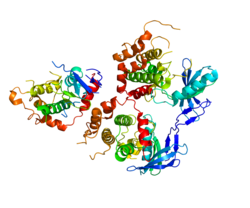Dual-specificity mitogen-activated protein kinase kinase 4 is an enzyme that in humans is encoded by the MAP2K4 gene.[5]
MAP2K4 encodes a dual-specificity kinase that belongs to the Ser/Thr protein kinase family. MAP2K4 phosphorylates MAP kinases in response to various environmental stresses or mitogenic stimuli. MAPK8/JNK1, MAPK9/JNK2, and MAPK14/p38 are substrates for MAP2K4, but MAPK1/ERK2 and MAPK3/ERK1 are not phosphorylated by MAP2K4. Structurally, MAP2K4 contains a kinase domain that is phosphorylated and activated by MAP3K1(aka MEKK1).[6] MAP2K4 contains multiple amino acid sites that are phosphorylated and ubiquitinated.[7] Genetic studies using Map2k4 knockout mice revealed embryonic lethality, impaired hepatogenesis and defective liver formation.[8][9] Analysis of chimeric mice identified a role for Map2k4 in T cell cytokine production and proliferation.[10] Map2k4-deficient chimeric mice frequently develop lymphadenopathy.[11] MAP2K4 is altered in 1.97% of all human cancers.[12]
- ^ a b c GRCh38: Ensembl release 89: ENSG00000065559 – Ensembl, May 2017
- ^ a b c GRCm38: Ensembl release 89: ENSMUSG00000033352 – Ensembl, May 2017
- ^ "Human PubMed Reference:". National Center for Biotechnology Information, U.S. National Library of Medicine.
- ^ "Mouse PubMed Reference:". National Center for Biotechnology Information, U.S. National Library of Medicine.
- ^ Lin A, Minden A, Martinetto H, Claret FX, Lange-Carter C, Mercurio F, et al. (April 1995). "Identification of a dual specificity kinase that activates the Jun kinases and p38-Mpk2". Science. 268 (5208): 286–90. Bibcode:1995Sci...268..286L. doi:10.1126/science.7716521. PMID 7716521.
- ^ "P45985 | SWISS-MODEL Repository".
- ^ "MKK4 (human)". www.phosphosite.org. Retrieved 2020-10-28.
- ^ Nishina H, Vaz C, Billia P, Nghiem M, Sasaki T, De la Pompa JL, et al. (February 1999). "Defective liver formation and liver cell apoptosis in mice lacking the stress signaling kinase SEK1/MKK4". Development. 126 (3): 505–16. doi:10.1242/dev.126.3.505. PMID 9876179.
- ^ Ganiatsas S, Kwee L, Fujiwara Y, Perkins A, Ikeda T, Labow MA, Zon LI (June 1998). "SEK1 deficiency reveals mitogen-activated protein kinase cascade crossregulation and leads to abnormal hepatogenesis". Proceedings of the National Academy of Sciences of the United States of America. 95 (12): 6881–6. Bibcode:1998PNAS...95.6881G. doi:10.1073/pnas.95.12.6881. PMC 22670. PMID 9618507.
- ^ Nishina H, Bachmann M, Oliveira-dos-Santos AJ, Kozieradzki I, Fischer KD, Odermatt B, et al. (September 1997). "Impaired CD28-mediated interleukin 2 production and proliferation in stress kinase SAPK/ERK1 kinase (SEK1)/mitogen-activated protein kinase kinase 4 (MKK4)-deficient T lymphocytes". The Journal of Experimental Medicine. 186 (6): 941–53. doi:10.1084/jem.186.6.941. PMC 2199046. PMID 9294148.
- ^ Swat W, Fujikawa K, Ganiatsas S, Yang D, Xavier RJ, Harris NL, et al. (May 1998). "SEK1/MKK4 is required for maintenance of a normal peripheral lymphoid compartment but not for lymphocyte development". Immunity. 8 (5): 625–34. doi:10.1016/s1074-7613(00)80567-1. PMID 9620683.
- ^ "MAP2K4 - My Cancer Genome". www.mycancergenome.org. Retrieved 2020-12-26.




